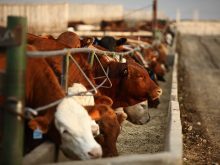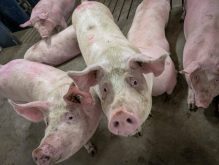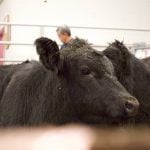Canada’s latest outbreak of bovine tuberculosis in domestic cattle involves a strain of TB bacteria not related to any previously seen in Canadian livestock or wildlife.
Culture testing of bacteria taken from a cow confirmed as TB-positive in November shows it’s “not related to past cases of bovine TB in Alberta or British Columbia or anywhere else in Canada,” the Canadian Food Inspection Agency said Wednesday.
The agency also said Wednesday it has now tested the “majority” of animals from that infected cow’s home herd in British Columbia’s southern Interior, and has so far turned up three more TB-positive cattle in that herd.
Read Also

U.S. livestock: Chicago cattle, hogs drop
Chicago cattle and hog futures fell on Wednesday. Most-active February live cattle futures lost 2.100 cents to settle at 234.525…
No part of any of the four infected cattle ever entered the food chain, the agency said.
Federal chief veterinary officer Dr. Jaspinder Komal, on a conference call Wednesday with reporters, said the genetic type of the B.C. cow’s TB strain also does not match the one seen in Canada’s most recent previous bovine TB probe, nor any other isolates found in Canada.
That previous bovine TB probe — launched on the September 2016 discovery of a southern Alberta cow with the disease — also involved a strain never previously seen in Canadian livestock, wildlife or people but which was “closely related” to a strain originating from cattle in central Mexico in 1997.
Asked whether the B.C. cow’s strain is connected to any seen in the U.S. or abroad, Komal replied that to CFIA’s “very preliminary” knowledge, the strain doesn’t appear to match any yet seen in Canada or the U.S.
The infected B.C. cattle’s home premises remain under movement controls, CFIA said, as do 10 other premises in B.C., 13 in Alberta and one in Saskatchewan, affecting a total of 18,000 animals. No herds in this probe have yet been released from movement controls.
The current investigation, run jointly by CFIA and the B.C. government, began after the first infected cow was presented for slaughter at a federally-registered facility on Oct. 26, 2018.
Post-mortem examination found lesions in that animal’s lymph nodes, lungs and liver; the carcass was then condemned and bovine TB was lab-confirmed on Nov. 9.
A federally reportable livestock disease, bovine TB has been subject to a mandatory nationwide eradication program since 1923. — Glacier FarmMedia Network















